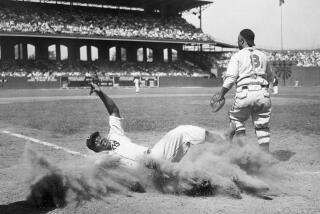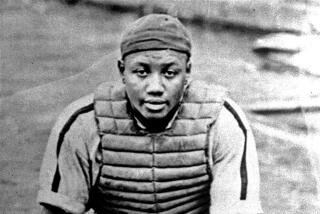QUESTION OF RACE : Debate Over Whether Black Athletes Are Superior to Whites Is Not New One
- Share via
On July 4, 1910, a Reno crowd of 20,000 sat in temperatures in the 90s to watch Jack Johnson, a black boxer, pulverize Jim Jeffries, a white, and ignite a controversial debate:
Are blacks athletes superior to whites?
Two days after the bout, the Los Angeles Daily Times published an editorial, claiming: “The white man’s mental supremacy is fully established, and for the present cannot be taken from him. . . . His superiority does not rest on any huge bulk of muscle, but on brain development that has weighed worlds and charmed the most subtle secrets from the heart of nature.”
Under the heading “A Word to the Black Man,” it continued: “Do not point your nose too high. Do not swell your chest too much. Do not boast too loudly. . . . Let not your ambition be inordinate or take a wrong direction. . . . Remember, you have done nothing at all. You are the same member of society you were last week. . . . You are on no higher plane, deserve no new consideration, and you will get none.”
That was 1910.
This is 1989.
We have seen Jimmy (the Greek) Snyder fired by CBS for saying that blacks are superior on the fields of play. We have seen Al Campanis fired by the Dodgers for saying that blacks may lack some of the necessities to hold important positions in baseball. In another decade, neither would have caused controversy with his remarks.
The voices of reason, however, seem to have progressed, if Tuesday’s NBC documentary, “Black Athletes--Fact and Fiction,” can be used as evidence.
The hourlong program, with Tom Brokaw as host, tackled the explosive issue, even considering whether the question itself is racist.
In the 79 years since the Johnson-Jeffries fight, the debate has resurfaced often, each time revealing the social attitude of the day.
At the 1932 Olympics, where U.S. black athletes such as Eddie Tolan, Ralph Metcalfe, Ed Gordan and Cornelius Johnson were spectacular, newspapers popped the question--are blacks better?
Wrote The Times’ Paul Lowry, Aug. 5, 1932: “The sun of the American Negro in track and field athletics is in the ascendancy.
“Aside from the orgy of record-smashing performances, this is the most striking development of the Tenth Olympiad.”
In 1936 at the Berlin Olympics, Jesse Owens put a damper on Adolf Hitler’s white supremacy show with remarkable performances.
In the mid-’30s, W. Montague Cobb, then a prominent black anatomist, wrote in the Journal of Health and Physical Education: “The physiques of champion Negro and white sprinters . . . reveal nothing to indicate that Negroid physical characters are anatomically concerned with the present dominance of Negro athletes in national competition.”
In 1968, The Times’ Charles Maher found many who disagreed with Cobb.
Putting the question to a random group of sports figures, Maher found many who believed blacks had a physical advantage.
Vince Lombardi, the famous Green Bay Packers coach, told Maher: “I think Negroes are more naturally endowed. They have more quickness. I think physique has a great deal to do with it. They’re built differently. Their muscular development is longer. Their muscles are not as bunched. They’re a longer type of muscle. This gives them greater spring and more quickness.”
And from Bill Rigney, then the Angels’ manager: “I think physically the Negro is a little bit stronger. I think he has a little more stamina. I think he has an extra amount of rhythm, too. I can’t remember a good Negro player who didn’t have a good swing--a swing so natural that if you were going to paint a swing that’s the way you’d paint it.
“There have been white guys with picture swings, too. But the Negro has more of a good, fluid motion about him. You notice there seem to be very few Negroes who can’t run. It just seems they’re wound a little tighter.”
A black player, Bernie Casey, formerly of the Rams, formulated his own opinion:
“First, the Negro was brought to this country as a physical specimen, a physical thing, to work the land. He was right away involved in physical labor. And he was involved in sports by the white slave owner. One owner might say to another, ‘My nigger can outrun your nigger,’ or ‘My nigger can beat up yours.’ This started a pattern of physical excellence. . . . Competition gave him an out, and it has continued that way through the years.”
Coaches 20 years ago had little scientific data to back their claims. Most anthropologists, Maher’s report found, did not study the American black.
Those scientists who had done some studies were reluctant to claim that there were differences.
Dr. Thomas K. Cureton, a professor of physical education at the University of Illinois, said he tried to research the reason for black superiority in athletics but was unable to find significant physical differences.
“To put it in a nutshell, I couldn’t say there are many differences that could be pinned down that could absolutely be said to be racial differences,” he said.
Cureton suggested that the reasons might be cultural.
“The performances of both whites and Negroes are modified tremendously by the social conditions in which they are brought up,” he said. “What is their ambition? What is at stake in sports for the white? For the Negro?
” . . . Once the Negro sees he has the chance, he is willing to make all kinds of sacrifices. This is not true of many American whites. They’re not as one-track minded.
“I’ve measured bodies all my life and I’ve found you usually don’t get differences (in performance) because of race. Because of other things, yes. Because of years of training, yes. Because of motivation, yes. Because of social goals, yes. Those make a difference. But not race.”
It happened in Super Bowl XXII last year at San Diego.
Once and for all the myth that blacks cannot successfully play quarterback in the National Football League was dispelled by Doug Williams, who led his Washington Redskins to a 42-10 victory over the Denver Broncos.
Much was made of Williams, the black quarterback, though his performance was as beautiful as any quarterback’s.
Twenty years earlier, they were asking a simpler question: Why are there no black quarterbacks?
“I don’t feel that the Negro quarterback has had the opportunity,” said Jake Gaither, a black football coach from Florida A&M; in 1968. “Each time one has been drafted by the pros, he has immediately been shifted to some other position. Pro quarterbacking requires five or six years of training and experience. They just don’t train Negroes at that position.
“(Pro) coaches probably would not want to use a Negro at quarterback unless they had complete assurance he would be acceptable to his teammates.”
Countered Dan Reeves, then president of the Rams: “There is no prejudice. If our scouting reports indicated a Negro was a fine quarterback, we’d certainly go after him. . . .
“If they are more natural athletes (as Reeves believed them to be then), maybe their ability makes it more natural for them to go out for halfback or end.”
Offered then-Redskin Coach Otto Graham: “I think the answer is simply that there’s never been a Negro good enough to play pro quarterback. I’m 110% behind the civil rights movement and it’s not important to me what color a player is. What’s important is whether he is a good player and what kind of person he is.”
In baseball, similar questions appeared over pitchers, an issue not even considered today.
Veteran administrator, Buzzie Bavasi, then Dodger general manager, said: “God gave the Negro good legs. Why waste his speed? Why make a pitcher out of him?”
In 1967, only 15 of 338 American-born pitchers listed in the Baseball Register were black.
One ’68 baseball authority who asked not to be identified, said: “Negroes are not supposed to have great stamina. You notice most Negro runners are sprinters, not distance runners. . . . They have great power and speed but maybe not as much endurance as whites.”
Of course, at the 1988 Seoul Olympics, male black African runners won every distance event from the 800 meters to the 10,000, and finished second and third in the marathon.
More to Read
Go beyond the scoreboard
Get the latest on L.A.'s teams in the daily Sports Report newsletter.
You may occasionally receive promotional content from the Los Angeles Times.










